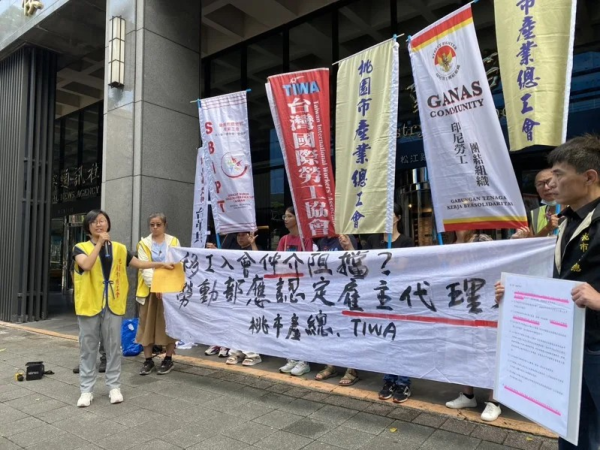
The Taoyuan Confederation of Trade Unions (hereafter “Taoyuan CTU”) filed a petition with the Ministry of Labor today (12th) and held a press conference, exposing a case in which migrant workers attempting to join a union were pressured by recruitment brokers to withdraw. The CTU called on the ministry to recognize the real influence recruitment brokers hold in workplaces and to include them under Article 35 of the Union Act as “employers or persons exercising managerial authority on behalf of employers,” in order to prevent unfair labor practices.
According to Taoyuan CTU, a grassroots union recently reported that more than 30 migrant workers successfully joined the union, but soon after, recruitment brokers intervened. brokers allegedly tried to retrieve the workers’ membership applications and, together with the company, held a briefing telling migrants: “You already have an agency, so you don’t need to pay union fees.” As a result, several migrant workers withdrew their membership, with resignation forms all citing the identical reason: “Already have an agency, no need to join a union.”
In response, Taoyuan CTU assisted the grassroots union in filing for an unfair labor practice ruling. At the hearing, the company admitted to “checking in” with migrant members, claiming they were concerned union dues might harm migrant workers’ interests. However, the union argued this was clearly interference with and obstruction of union operations, and should be penalized under the Union Act. Authorities, however, ruled that brokers were not “persons exercising managerial authority on behalf of employers,” and thus not subject to restrictions under the law.

Taoyuan CTU Secretary Sun Yu-chien stressed that government-standardized contracts between brokers and employers already stipulate that brokers must assist in managing migrant workers—including workplace rules, daily life management, and even decisions on discipline and retention. In practice, brokers wield managerial power, but because they are not legally defined as employer representatives, they can intervene in union matters with “power but no accountability,” effectively serving as outsourced enforcers suppressing union activity.
Wu Ching-ju of the Taiwan International Workers’ Association added that migrant workers’ right to organize is already heavily constrained by three-year contracts and strict limits on changing employers. brokers, which control employment and contract renewals, often hold greater influence than employers themselves—making migrant workers even more afraid to join unions.
Sun further noted that under other laws, such as the Gender Equality in Employment Act, brokers are already considered equivalent to employers and bear responsibility. In sexual harassment cases, courts have also recognized brokers as employers. Since both the Labor Standards Act and the Union Act were enacted to protect workers in unequal power relationships, and because brokers, like employers, can infringe on workers’ rights, they must be held to the same legal obligations.
Taoyuan CTU urged the Ministry of Labor to take initiative—either through legislative amendments or legal interpretations—to bring migrant worker recruitment brokers under the scope of Article 35 of the Union Act, recognizing them as “employers or persons exercising managerial authority on behalf of employers.” This, they argued, is essential to stop brokers from suppressing or obstructing migrant workers’ right to join unions, and to ensure that workers’ right to organize is genuinely protected under the system.
[TWM / Reporter Tseng Ping, Taoyuan ]20250812 21:10
[Photo by Reporter Yeh Guanyu / Lyu Xianghe from AWN]
